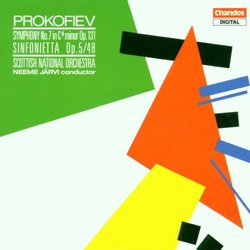Great Pieces, Lackluster Presentation
Karl Henning | Boston, MA | 12/07/2000
(3 out of 5 stars)
"The Seventh is Prokofiev's great underrated symphony. Prokofiev himself is the great underrated compositional talent of the twentieth century. And the Seventh is the key to understanding this.The Opus 131 is greatly underrated, because here Prokofiev cares nothing for pushing the envelope; he simply says what wants saying, within the sonata/symphony tradition. This was anathema in the twentieth century, when noisier elements tried to make "tradition" a dirty word. The exquisite beauty of Prokofiev's Seventh is, its very effortlessness, its songfulness, its enchanting transparency. There is here no Beethovenian struggle, no Brahmsian equivocation.The sound, and the simplicity, are the message here. The opening is the sort of half-chilling expanse-opening sonic event which is almost one of Prokofiev's signatures, echoing the introductions to "Romeo & Juliet" and "Cinderella." Prokofiev was a brilliant pianist, and one of his trademarks is how the piano as a faceless member of his symphonic orchestra can make a subtle-yet-unmistakably-present impact (especially in the fifth and seventh symphonies).This performance suffers from lack of preparation. There are, for example, moments when the violas are wonderfully showcased, but they are not in synch with the orchestra; the fault is neither the violas', nor the orchestra's, but the director's. The Seventh is so well written, that it sounds well even in poor performance -- and the Scottish National Orchestra play well even when not on their game -- but this recording gives the impression of Järvi and the orchestra keeping to a production schedule, to issue a complete-Prokofiev-symphonies commemorative set. A worthy aim, and meriting greater care.If the Seventh Symphony is underrated, the Sinfonietta is simply undiscovered. This is a gem of light orchestral music; it is more balletic than most of Prokofiev's symphonies, and in many respects is a much surer display of Prokofiev's brilliantly inventive ear for orchestration, than the "problematic" symphonies 2 through 4.These two orchestral works of Prokofiev's are essential twentieth-century listening; they deserve better presentation. This recording is the right idea; these works of Prokofiev's are great art, and like "Hamlet," are magnificent even in modest circumstances."
Interesting Jarvi's approach!
Hiram Gomez Pardo | Valencia, Venezuela | 04/08/2005
(4 out of 5 stars)
"Prokoviev was very, very sick when he decided to write this last Opus Symphonic. But the sum of the final result was an incredible work without any little bit of self indulgence or affection.
From the first bars of the First Movement you can perceive the composer is looking for his beloved land in this melancholic main motive; it is not tearful it's just reminiscent, articulated with accuracy . The Second Movement is characterized such a festive movement. It seemed the composer is just making a living account of his early years. The third Movement is simply a ravishing melody; tender and slender, the last suspire just before the ending.
And finally that glorious and unforgettable Fourth Movement loaded with joy of living. The second theme is a re insertion of the main motive of the First Movement and suddenly he turns the mood, bringing us in the coda an assertive and dazzling climax. Very short but equally affirmative.
There have been very few versions capable to reflect the real insight. Prokoviev abandons the poignancy and literally searches for his last elevation, simplicity but ornamented by a sumptuous orchestra and a major director. If both factors do not blend the result can be less than satisfactory to say the least.
"


 Track Listings (9) - Disc #1
Track Listings (9) - Disc #1